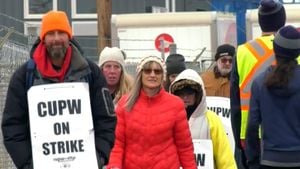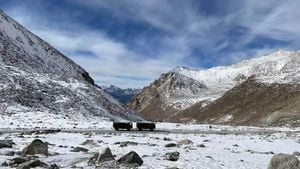FERGUS FALLS, Minn. - A tragic tale unfolded on the border between Canada and the United States when the bodies of four members of the Patel family were discovered frozen to death after attempting to cross during harsh winter conditions. Prosecutors now allege human smugglers put profit before human life, leading to this devastating outcome.
The trial for two men, Steve Shand and Harshkumar Patel, began on Monday, presenting to jurors the harrowing events surrounding the family's last moments as they navigated the treacherous 12 meters separating them from safety. On January 19, 2022, temperatures plummeted to -23°C, accompanied by bone-chilling winds making it feel even colder, around -35° to -38°C.
Jagdish Patel, 39, his wife Vaishali, 37, and their two children, 11-year-old Vihangi and three-year-old Dharmik, embarked on their ill-fated trek believing they could escape hardship at home. Tragically, after reportedly following the smugglers' directions, they found themselves enveloped by blizzard conditions, with poor clothing ill-suited for the harsh Canadian winter. Prosecutor Ryan Lipes characterized the desperate scene, explaining how little Dharmik's father was found desperately trying to shield his son from the cold.
Shand was apprehended by border patrol agents around the same time the bodies were discovered, seized with other Indian migrants he was reportedly transporting. Patel was arrested months later and is described by authorities as possibly managing the smuggling operation from afar.
Shand and Patel are each facing numerous charges related to human smuggling and have pleaded not guilty. Their defense argues they were merely drivers, unwittingly caught up in the smuggling web. Shand's defense suggested he might not have realized the full scheme until it unraveled catastrophically.
Defense attorney Lisa Lopez portrayed Shand as just another innocent cab driver who occasionally picked up Patel's associates. “He thought he was just driving his cab—because that's what he does for a living,” she told jurors. Meanwhile, Patel's attorney, Thomas Leinenweber, argued his client had no involvement, calling him the “luckiest man” for having access to the rights of fair trial and presumed innocence.
Controversy arose during proceedings when discussions emerged about potentially displaying gruesome photographs of the frozen Patel family, with the prosecution arguing their inclusion was necessary to highlight the inadequate clothing provided to the family. Judge John Tunheim ruled the photographs could be shown, catalyzing tension between prosecution and defense.
During jury selection, potential jurors were questioned about their views on immigration and law enforcement, with some being dismissed due to apparent biases on the immigration debate. The trial seeks to navigate the complex emotions around this heart-wrenching case, especially concerning the deaths of young children.
The prosecution's case outlined allegations of systematic human smuggling, positing Shand and Patel as part of broader operations to facilitate the crossing of Indian nationals, especially migrants possessing student visas. They alleged coordination with other smugglers operated from Canada and emphasized the familial element, citing the heartbreaking consequences of greed overshadowing risks.
Testimonies expected throughout the trial include several law enforcement witnesses and forensic experts who had performed autopsies on the deceased Patel family. Testimony may also come from other migrants from the same group who faced the same perilous conditions.
This case not only revolves around two alleged smugglers but also highlights the stark reality faced by many desperate individuals seeking refuge and opportunity. The imbalance created by organized efforts to smuggle migrants has far-reaching and devastating consequences.
The trial, set to run over five days, carries significant attention as it puts forth the broader issues of immigration and human trafficking across the U.S.-Canada border—a narrative too often shrouded by silence.
After the trial's opening statements, jurors remarked on the gravity of the situation, aware they were tasked with determining the culpability of the two men alleged to have put their profit-driven agenda above the lives lost during the tragic crossing.
More than just legal proceedings, this case serves as a reminder of the dire circumstances many families face, risking everything, often influenced by those who take advantage of their vulnerable situations for profit. The hearts of many will undoubtedly remain with the Patel family—a reminder of the lives impacted by the clash of hope for new beginnings and the harsh reality of survival.



